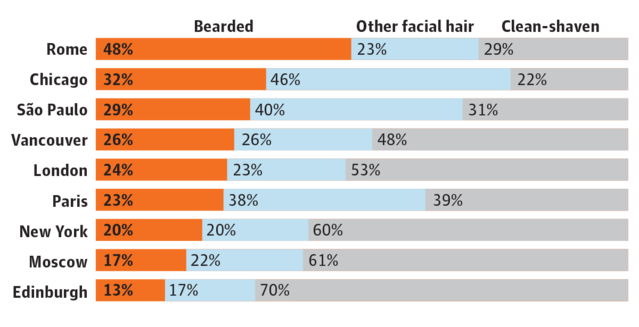Welcome to Beard City
Does population size influence the popularity of facial hair?
By Matt Huston published January 3, 2017 - last reviewed on March 7, 2017

A man might choose to shave or grow out his beard to assert maturity, obey cultural rules, or defer to a partner's wishes. But with a recent paper in Evolution and Human Behavior, anthropologist Barnaby Dixson and colleagues argue there might be additional, more primal factors involved in these grooming choices.
To explore them, the researchers first measured the preferences of women from around the world for clean-shaven or bearded faces, then gauged the prevalence of facial hair in samples of male Facebook users in 37 countries. Demographic measures were also analyzed.
On average, women in lower-income countries preferred beards more strongly—and where women's preference for beards was greater, more men sported them. Why might the appeal of beards be more pronounced in less prosperous places? One possibility is that women evolved to favor beardedness under those circumstances, Dixson suggests: Studies indicate that beards boost perceptions of dominance, so a man's having one may send a message to women that he is able to acquire resources.
Beards were also more widespread among men in more populous cities. The increased anonymity of big cities may play a role. "In small-scale societies, everyone kind of knows one another, their family lineage, whether they own quality resources," Dixson explains. "In a big city, you have to step out into the world without any of that bolstering your social standing." In the most jam-packed places, facial hair may serve as a handy advertisement of masculinity, helping bearded men stand out in the crowd.
Beardedness of Facebook Users in 9 Cities

